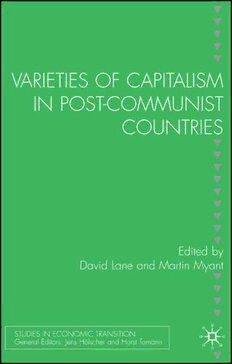
Varieties of Capitalism in Post-Communist Countries PDF
293 Pages·2007·0.808 MB·English
Most books are stored in the elastic cloud where traffic is expensive. For this reason, we have a limit on daily download.
Preview Varieties of Capitalism in Post-Communist Countries
Description:
Former communist countries have, in one way or another, been heading towards capitalism. However, it has for some time been clear that 'capitalism' can take a variety of forms, both in countries with long-established market economies and in those undergoing transformations now, or in the recent past. This book sets the experience of the transformations of post-communist countries in east-central Europe, the Commonwealth of Independent States and Asia against the 'varieties of capitalism' paradigm, using an approach based on institutional economics. By avoiding the assumption that all transformations must lead into one kind of market economy, this provides a useful and novel framework for comparing the courses and current outcomes of very different transformation processes. The themes from the "varieties of capitalism" paradigm provide a helpful basis for assessing these transformations, but the heritage of the communist and even pre-communist pasts, lower levels of development and various informal institutions mean that there is no close fit with the ideal types used for analysing and comparing mature market economies. The work therefore has implications for the more general discussion of differences between kinds of capitalism, pointing to the need to place more emphasis on change and development and hence to political forces and social interests. It also points to the importance of informal, rather than just formal, mechanisms, including the extent of corruption and, more generally, the nature of ties between individuals in the business and political spheres which can distort, or disrupt, the development of any kind of functioning market system.
See more
The list of books you might like
Most books are stored in the elastic cloud where traffic is expensive. For this reason, we have a limit on daily download.
